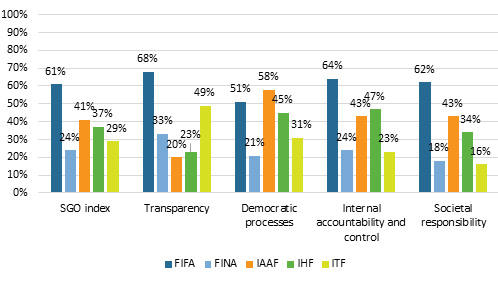Despite reforms, public pressure is still needed to improve sports governance
Public pressure and independent monitoring seem to be essential for motivating international sports federations to carry out reforms to prevent corruption and enhance efficiency.
This lesson can be drawn from a new study examining the level of good governance in five of the most important international sports federations, including FIFA and the IAAF.
Moreover, it shows that although reforms have been implemented in some federations, they fail to live up to sufficiently high standards. Generally, the surveyed IFs lack clear communication of strategies, fail to include stakeholder groups in policy decisions, and lack independent board members.
These are some of the main findings from the new and updated Sports Governance Observer 2018 (SGO2018) study presented at a seminar held in Leuven, Belgium, Tuesday 13 November 2018. The study is assigned and financed by Play the Game thanks to an earmarked grant from the Danish Parliament.
Through 309 indicators, 57 principles and four dimensions (transparency, democratic processes, internal accountability and control, and societal responsibility), five international federations have been examined with a view to assess to what extent they live up to selected governance criteria.
The five federations included in the SGO2018 are: FIFA (football), FINA (swimming), IHF (handball), IAAF (athletics), and ITF (tennis), and results show that the level of good governance varies significantly across the surveyed federations.
Figure 1: Scores of the surveyed international federations on the SGO index and dimensions

With an average SGO index score of 38%, the surveyed international federations clearly have areas in need of improvement and among the significant findings in the SGO 2018 report are:
- The federations’ boards are not adequately held to account by the general assembly.
- The federations fail to act strategically, meaning that they do not establish clear strategic plans that outline objectives and envisioned actions.
- The federations do not have formal strategies for involving different stakeholder groups in their policy processes.
- Establishing term limits appears to become an accepted standard of good governance in international federations. By contrast, a number of good governance elements are not (yet) introduced as standard: independent board members, making corruption risk assessments and publishing conflicts of interest, funding anti-corruption controls, and organising board self-evaluations.
- With the exception of FIFA, the surveyed federations generally fail to report adequately on policy plans, board decisions, and allocated funds. Publishing such information is easy to do and should be regarded as a short-term priority.
The SGO2018 shows a significant difference between those federations who have been embroiled in public scandal at the global level, and those whose work often goes under the media radar.
“With FIFA and the IAAF as the highest scoring federations, the SGO2018 highlights that political as well as public pressure has a positive effect on the quality of governance structures implemented”, says the author of the study, Arnout Geeraert, Senior Research Fellow at KU Leuven, and Associate Professor with Utrecht University.
“In federations that have not been scrutinisedby the media and other public bodies, the governance changes often seem to be more cosmetic than fundamental,” he concludes.
International governance vs. national governance
The international federations do not need to look far to get inspiration for their improvement. Another study, presented simultaneously in Leuven, shows that the international bodies, particularly FINA, the ITF, and the IHF, are outperformed by some of their European member federations on all four dimensions of good governance.
The National Sports Governance Observer 2018 (NSGO 2018) has mapped the level of governance in national sports federations, allowing a comparison between the international and national federations in the same sports.
In addition to the aim of providing a holistic and objective picture of the standard of governance in world sport, the SGO2018 also wishes to initiate and stimulate qualified debate.
Further reading
Read more about the National Sports Governance Observer






